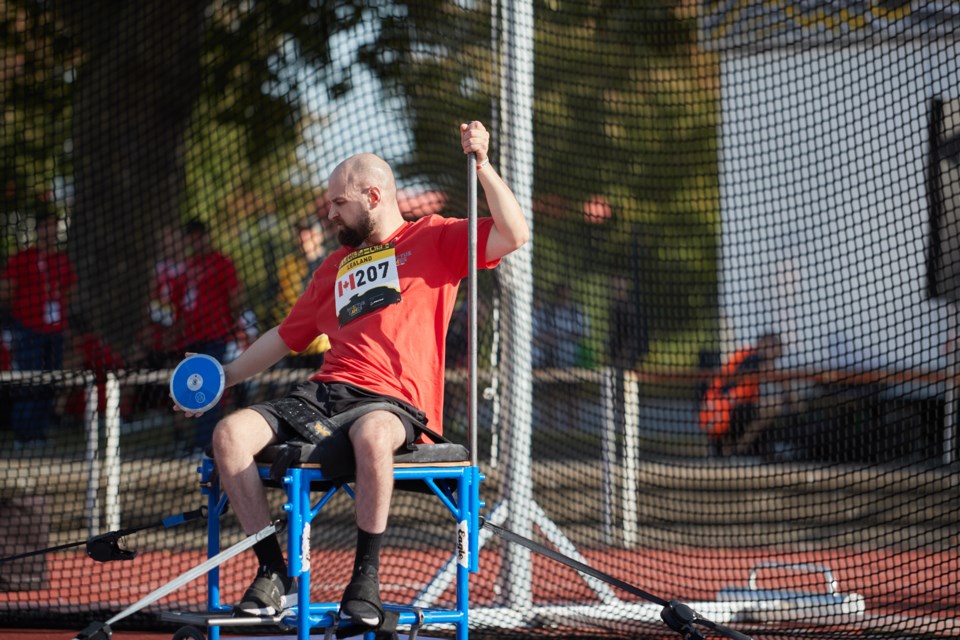The Whistler Institute’s Global Perspectives Speaker Series is just around the corner, with the first event set for Sept. 19.
First on deck to speak is retired Cpl. Lealand Muller, who brings his expertise as a wheelchair user and Invictus Games athlete. Pique interviewed Muller to get a sneak peek about his lecture, and his journey to becoming an advocate for accessibility.
Muller first started presenting about overcoming adversity after the Invictus Games in 2023. He was in Toronto's Pearson International Airport waiting for a flight back home to Winnipeg after the Games, and a man asked him what his Invictus shirt meant.
“I told him that's an opportunity for veterans to overcome injury and illness through sport. And he was the president of a Rotary Club in Winnipeg,” Muller explained.
Through that chance encounter, he spoke at a Rotary event, and then was invited to speak at schools during Remembrance Day, and eventually at his physiotherapy clinic.
His first presentation for Rotary focused on what Invictus Games is and touched on overcoming adversity and tragedy. His Remembrance Day talk to kids in Grade 6 centred around the military and veterans, whereas his physio appearance was about para sports.
“A lot of people at the clinic were curious about the para sports and all the different barriers to entry that people face getting into para sports, whether it be costs or access to equipment or access to the facilities that can be a difficult thing to overcome,” he said.
For his talk in Whistler, Muller will merge all three topics, taking the audience on his personal journey overcoming trauma through sport while advocating for accessibility in built environments or other places, like captioning for people with hearing loss.
He’s currently in Vancouver advising hotels about their accessibility opportunities ahead of the Invictus Games in Vancouver and Whistler, set for February 2025.
“I've been going out to all the different venues and looking at it from a perspective of a past competitor, but also just a wheelchair user, and trying to improve on the experience that I had in Germany,” he said.
Whether it’s having a ramp to access a building, elevators or doors wide enough for a wheelchair, barriers are built into the world Muller and others navigate every single day. These barriers can prevent someone from living their life to the fullest for the sheer amount of planning required before they can go out.
“Everybody can use accessible adaptations and accommodations in a building," he said. "The long-term benefits from making the world's built environment more accessible benefits everybody.”
A 25-per-cent chance to walk again
Muller sustained a catastrophic spinal cord injury which left him paralyzed from the waist down, and once he was stabilized, doctors told him there was a 25-per-cent change he could walk again.
“That’s not something anybody wants to hear," he said. "In that moment during the injury, I knew already how difficult life was going to be.”
Muller has made it his life’s goal to learn to walk again, in whatever capacity he’s able, whether with support or by himself.
“I have a video of me doing exactly that, just walking on my own with the parallel bars," he said. "It has taken me six years to get to that point in the video that I'll show [at the lecture], and I have a long way to go still. If you really, really want something, and you really believe in why you're doing it, incredible things are possible."
Before the injury, Muller was very active and easily picked up sports without batting an eye. Being in a wheelchair, he’s gained an appreciation for continual practice to succeed at a sport.
At the Invictus Games in 2023, he competed in discus throwing, hand cycling and wheelchair basketball, and he encourages others to try sports not to master them, per se, but out of curiosity.
“At first it was discouraging. I was used to succeeding in everything I used to try before, and now that wasn't the case," he said. "Eventually, over time, after practicing several hours I was able to become proficient enough to the point where I felt confident in competing in international events.”
Competing in the Games inspired him even more, with athletes adapting to sports all around him.
“You can't help but be inspired and not let your own personal obstacles keep you down, and when you overcome those moments in sports, you can't help but have that carry over into every other aspect of your life,” he said.
To hear Muller speak, you can get a ticket to the Whistler Institute’s Global Perspectives Speaker Series on the organization’s website and catch his Sept. 19 lecture at the Maury Young Arts Centre, with doors at 5:30 p.m.




